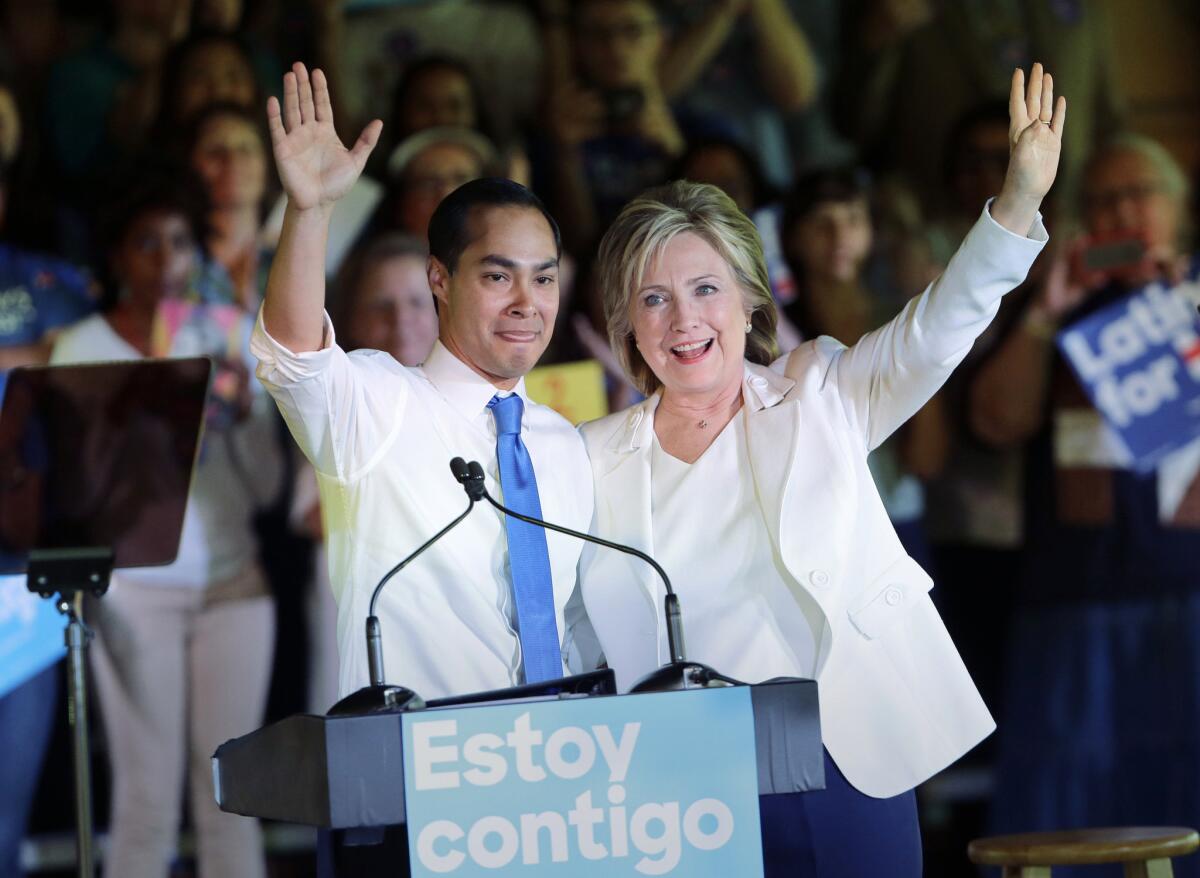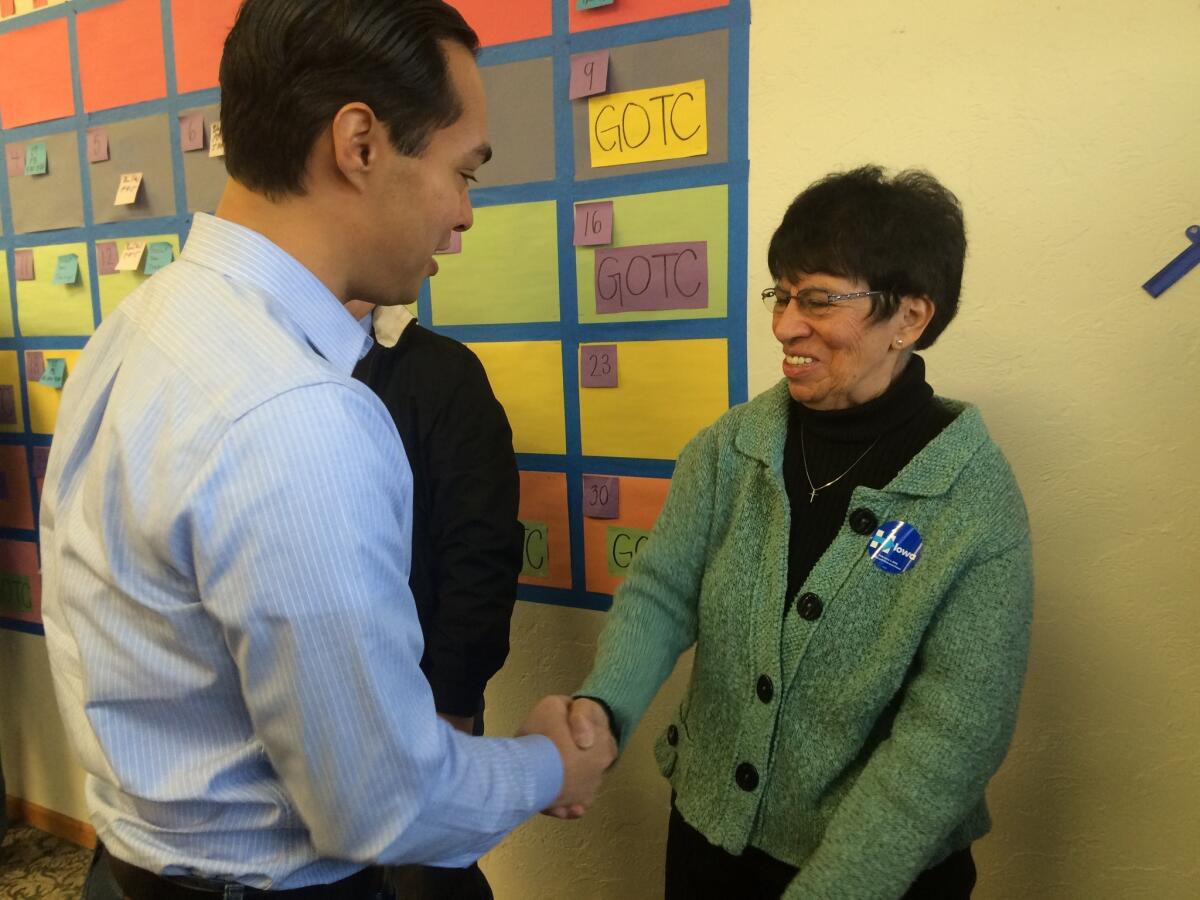A Clinton-Castro ticket gets put to an early test in Iowa

Hillary Clinton, right, stands with Housing and Urban Development Secretary Julian Castro after she was introduced during a campaign event in San Antonio.
Reporting from Ottumwa, Iowa â Julian Castro, a rising star in the Democratic Party, was stumping for Hillary Clinton in southeastern Iowa on Sunday when a union leader extended a hand and a question in Spanish.
âI heard Clinton might pick you for vice president,â said Jose Pulido, who represents workers at a hog slaughterhouse that has helped draw thousands of Latinos to this small city straddling the icy Des Moines River.
Castro flashed a toothy smile. âQuiĂŠn sabe,â he answered, shaking his head. Who knows?
See more of our top stories on Facebook >>
As the secretary of Housing and Urban Development and former mayor of San Antonio, Castroâs ethnic roots, up-from-the-bootstraps story and quick ascent in politics have earned him comparisons to President Obama. He is frequently mentioned as a possible vice presidential pick for Clinton, should she prevail as her partyâs nominee.
In something of a test of Castroâs campaigning abilities, he barnstormed Iowa in the final days leading up to the stateâs Feb. 1 caucus. He visited several small cities with growing Latino populations and warned voters about the dire consequences of a Clinton loss and the possible return of the White House to Republican control.
âWe absolutely canât afford to hand over the presidency to the Republican Party,â Castro told a crowd in Fairfield, his second stop of the day. âCan you imagine what would happen if you have Speaker [Paul] Ryan, Senate Majority Leader [Mitch] McConnell and President Trump?â
âWeâve seen what theyâve done when theyâve had that kind of power,â he added, hinting at the kind of attack-dog sensibility that presidential candidates often rely on in a running mate.
In recent months, several leading Latino leaders, including former Housing Secretary Henry Cisneros, have called on Clinton to add Castro to her hypothetical ticket. The national Hispanic Chamber of Commerce issued a formal endorsement of Castro for vice president Saturday, even though it hasnât yet endorsed a candidate for president.
Pollsters and pundits agree that any presidential ticket could benefit from a qualified Latino to help win votes from the nationâs fastest-growing demographic. And at 41, Castro would provide a generational contrast to 68-year-old Clinton.
Here in Iowa, a rapidly expanding Latino electorate mirrors the United States as a whole, where a record 27.3 million Latinos will be eligible to vote this year. The stateâs Latino population grew 110% between 2000 and 2014, and Latinos constitute 10% or more of eligible voters in 11 of the 99 counties here.
The rise of Latinos in U.S. society is also reflected in Castroâs story, which he repeated often in Iowa.
Castro and his identical twin brother, Joaquin, were raised in San Antonio by their Chicana activist mother and Mexican immigrant grandmother. They graduated together from Stanford University and Harvard Law School before launching parallel political careers.
Joaquin was elected to the Texas Legislature and is now a Democratic member of Congress representing part of San Antonio.
Julian, who was born one minute earlier and jokes that he is older â and wiser â than his brother, was elected at age 26 to the San Antonio City Council, becoming its youngest-ever member. He went on to win three terms as mayor, where a key initiative was the passage of a sales tax increase to help pay for an expansion of prekindergarten, part of a wave of similar proposals among Democrats around the country in recent years.
In 2014, President Obama offered Castro a position in his Cabinet. Castroâs short tenure as Housing secretary will end when Obama leaves office in a year.
Castro says he decided to endorse Clinton in part because she âhas the deepest ties and the longest track record of working for the Latino community,â citing her work registering Latino voters in south Texas in the 1970s.
Clinton has said she would âlook hardâ at Castro for any position in her campaign or administration. Other names floated as possible Clinton vice presidential picks include Virginia Sen. Tim Kaine and New Jersey Sen. Cory Booker. Both campaigned in Iowa for Clinton over the weekend as well.
For his part, Castro has become practiced at ducking questions about the vice presidency, saying he is focused on winning her the nomination.
And a lot of work lies ahead. While Clinton won a coveted endorsement from the Des Moines Register on Saturday, polls show Sen. Bernie Sanders slightly ahead in what is shaping up as a closely fought battle in this state.
Sanders and third-place Democratic contender Martin OâMalley are challenging Clinton for the Latino vote, with the Sanders team opening a campaign office in one of Ottumwaâs many empty storefronts, and OâMalley visiting the city Sunday evening.

Julian Castro greets Sister Irene Munoz, a Hillary Clinton volunteer, at a campaign event in Ottumwa, Iowa, on Sunday.
The Clinton campaignâs Latino outreach efforts here are led by Irene Munoz, a Roman Catholic nun who has watched the town change in recent years as Latinos have moved in to take low-paying jobs at the pork processing plant on the southern edge of town.
Munoz, who wore a gold cross around her neck and a Clinton sticker on her sweater, leads a weekly Spanish phone bank for Clinton and asks Latinos to sign bilingual pledge cards committing to caucus for her. She said she expects record Latino turnout at the precincts in her area but said some voters are wary of caucusing, telling her, âI donât speak much English. How will they understand me?â
Munoz clapped excitedly when the telegenic Castro arrived at Clintonâs headquarters, posing with him for several pictures and speaking to him in Spanish about his familyâs roots.
âOh, heâs handsome, isnât he,â a friend of hers cooed.
Castroâs campaign trail duties have not been limited to Latinos. During a stop in Fairfield, a liberal city known for its large number of adherents to transcendental meditation, he told a mostly white crowd that Clinton is the only candidate with âthe vision and the energyâ to keep the country safe and to create opportunity for advancement for all.
Holly Moore, a Clinton volunteer in Fairfield, came away impressed. She said she liked Castroâs politics, especially his work to expand education opportunities for young children.
His ethnicity, she said, is a nice bonus. âI donât think anybody can be president anymore without a diverse ticket,â she said.
For more campaign coverage, follow @katelinthicum
MORE POLITICS NEWS
Obamaâs bet on the 2016 election: The candidate âwho can project hopeâ
A week before the Iowa caucuses, Democrats seek an edge in front of voters at town hall
Sundance film âWeinerâ throws a light on modern politics -- and Hillary Clinton
More to Read
Get the L.A. Times Politics newsletter
Deeply reported insights into legislation, politics and policy from Sacramento, Washington and beyond. In your inbox three times per week.
You may occasionally receive promotional content from the Los Angeles Times.











